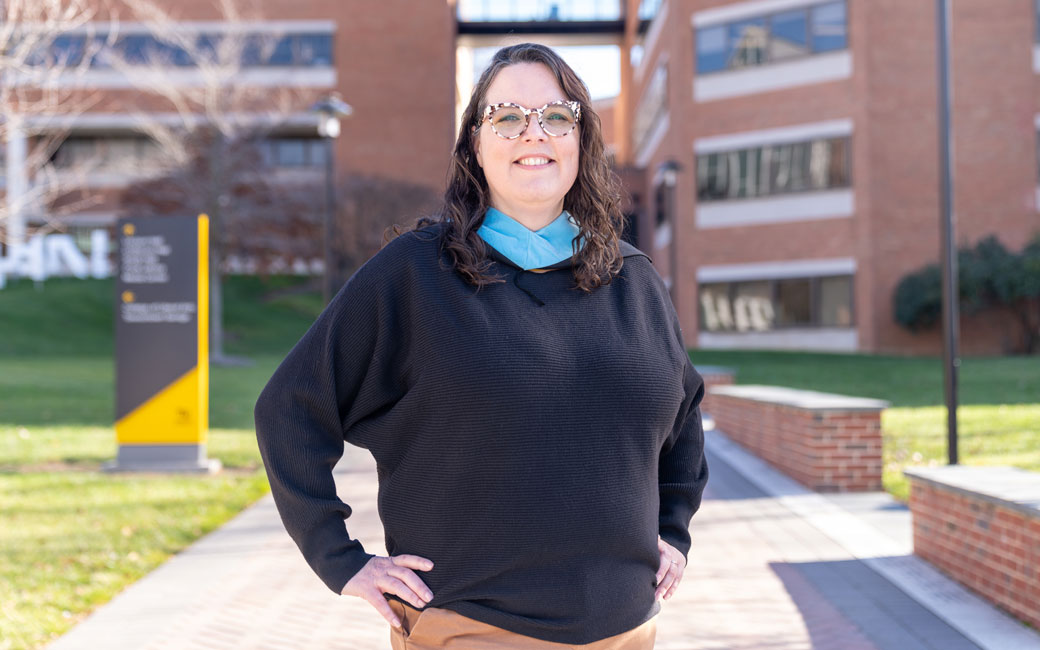Finding her passion in education
Shannon Tucker values the nonlinear path to her doctoral degree
By GRACE HOGGARTH '22 on December, 12 2023

Shannon Tucker didn’t always know she wanted to pursue a doctorate. But with a passion for instructional design and building more inclusive learning environments for students, TU’s Doctor of Education program offered her a valuable pathway to achieve her goals.
Tucker began her pursuit of her degree in TU’s College of Education with the department of Learning Technologies, Design and School Library Media in spring 2017 but passion for learning has been consistent throughout her life.
As a first-generation college student, Tucker has always had a growth mindset and a drive for constant exploration. Pursuing education was a way to connect all of her experiences and support the work she is doing now. Her Clifton Strengths top-three trait, Learner, reinforces this for her.
“Seeing representation is really important,” says Tucker.
After receiving a bachelor’s in visual arts with a focus on multimedia design from University of Maryland Baltimore County, Tucker began working at the University of Maryland School of Pharmacy as a web developer where she was eventually appointed as the assistant dean of instructional design and technology.
During this time, she pursued her master’s degree in interface design and informational architecture at the University of Baltimore—all of which led her to choosing her doctoral program at TU.
“When I considered pursuing a doctoral degree, I felt that an education focus would bring my various backgrounds full circle,” she says.
It is uncommon for doctoral students of education to have a background in multimedia design and user experience like Tucker; however, it enabled her to bring a unique perspective to her cohort and connect with her peers meaningfully.
“I felt a little bit like a fish out of water with my eclectic background. But connecting with other students helped me recognize that I have something unique to give,” she says.
In her role at UMD’s School of Pharmacy, she supports core educational delivery of their pharmacy-related programs.
“There is a lot of value beyond what some students think they can do with a degree in education. Education is everywhere, and we’re learning all the time,” she says.
When making her decision to choose a doctoral program at TU, Tucker valued the flexibility the College of Education provided in choosing one’s own research interest area. The program enabled her to blend her design and technical experiences in her research in learning experience and design (LXD). The department had also been recommended to her in the past, which she found to be an encouraging sign.
Tucker’s dissertation, Exploring learner preferences and information processing using multimodal instructional resources, studied online learners and how their preferences influence their use of instructional materials. The goal of her research was to discover how faculty and instructional designers can select and design resources to inclusively support students. Experiencing the COVID-19 pandemic during the height of her research enabled Tucker to produce rich findings.
Dr. Liyan Song, professor of instructional technology, sat on Tucker’s dissertation review committee. “I am very proud of Shannon's dissertation research. The findings from her study shed light on the experiences of learners navigating online environments, offering invaluable insights into learners' information processing behaviors,” she says.
“Conducting dissertation research during the COVID-19 pandemic was a formidable task. Shannon demonstrated unwavering resilience and commitment to quality research despite the challenges.”
Throughout her studies, Tucker built a community of practice within her program, a commitment that supported her and her peers, particularly during the pandemic. The group provided informal mentoring and met weekly during the pandemic to provide support during the dissertation process. It instilled a sense of belonging to the college and enabled her to build connections that she will value for the rest of her career.
As she looks forward to Commencement on Dec. 20, Tucker shares that she is leaving TU with much more than she expected when she first entered the program.
“My colleagues and I will be the first Ph.D. graduates from our department. I have so much more perspective on the opportunities that this degree provides. I’m hopeful we will see more growth within this program in the future,” she says.
After graduating, Tucker hopes to get more involved in TU’s Generation One Program, a program providing TU's first-generation college students with tailored mentoring and guidance to foster academic and personal accomplishment.